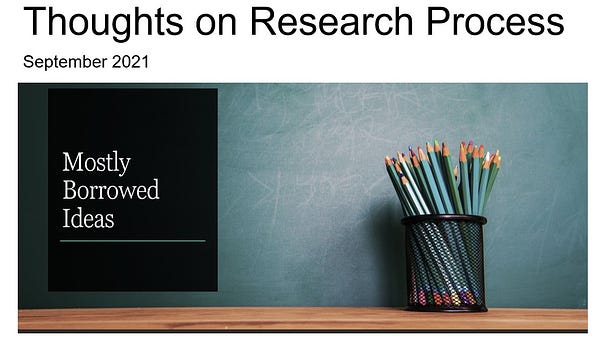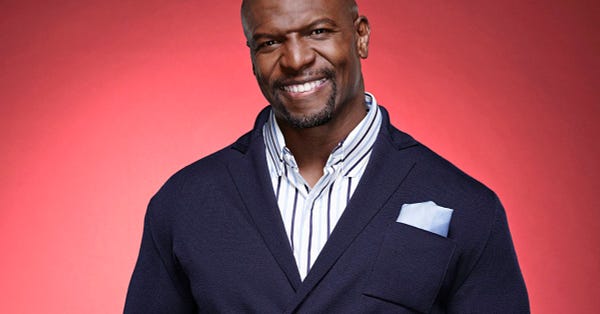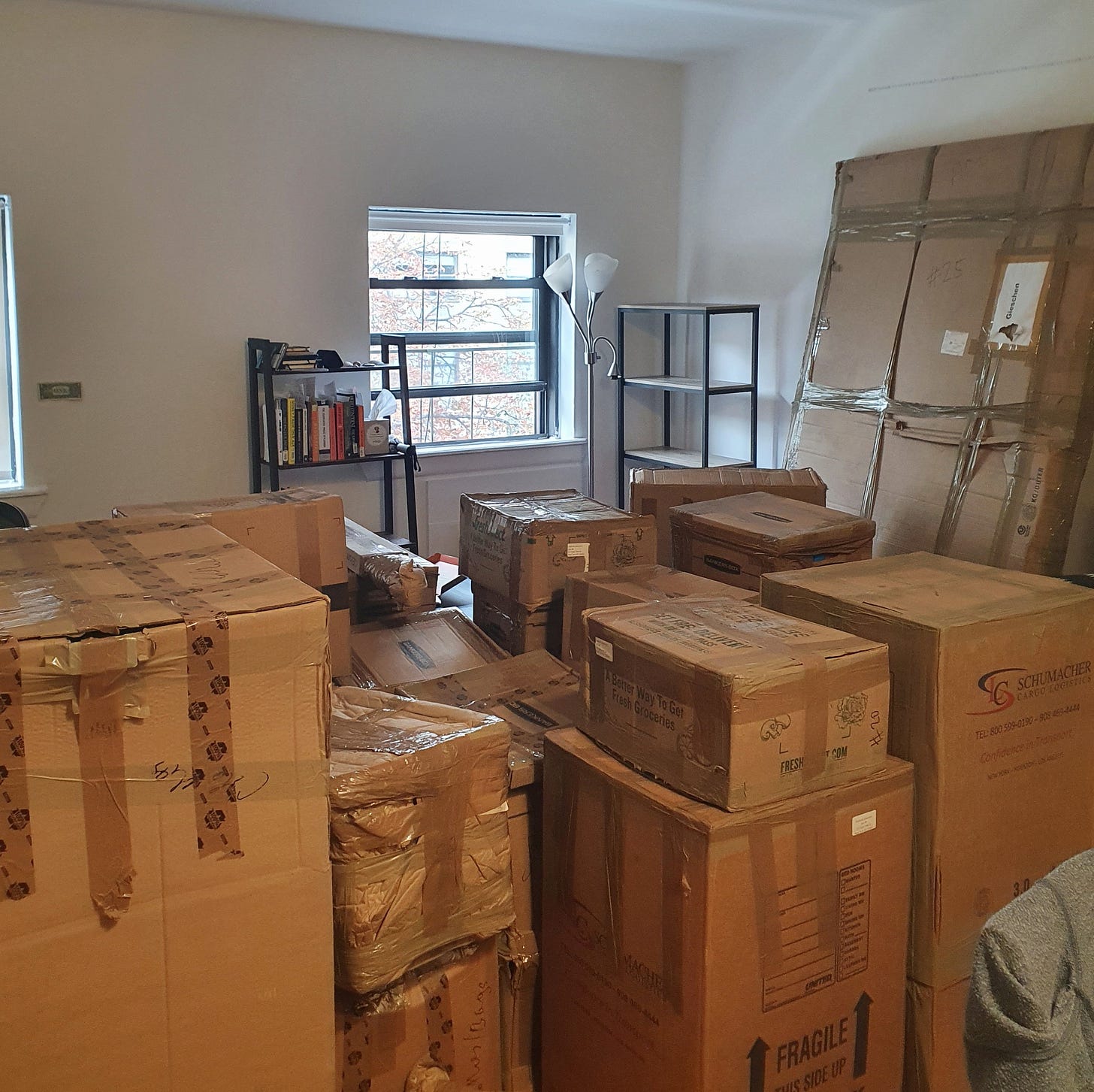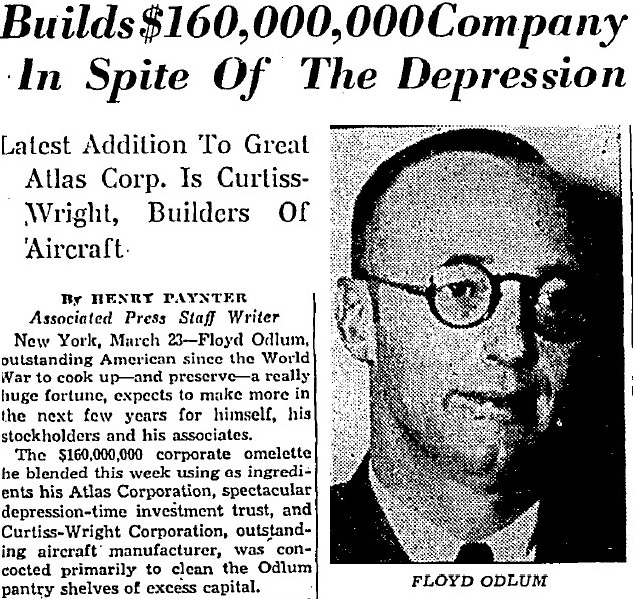Workshop Note
"We write it for ourselves. Putting ideas on paper forces you to think things through."
Hi all,
More than four months after returning to New York, my stuff has finally been delivered. Moving back and forth across the Atlantic in 2020 and 2021 has been expensive and exhausting. You should have seen the faces of the movers when I told them I lived in a fourth floor walk-up apartment. I hope there won’t be a next time but I would consider calling 1-800 JUNK and wiping the slate clean.😉
On the positive side, I have my books back and that’s nice. I will be busy unpacking today and thought this was a good time for a quick update about stuff I’m working on and have been reading.
I hope you are all doing well.
Next up:
Last Saturday, I published my profile of Floyd Odlum (teaser below and twitter thread here). I recorded a conversation with David Clarke, the author of his unpublished biography, which I plan on releasing this week. Unfortunately, we had a few glitches which means I am learning the basic techniques of cleaning up podcast audio.
I will also soon publish a Q&A with Luke Burgis, author of the book Wanting, about memetic desire. I think you will enjoy Luke’s perspective on how to apply René Girard’s ideas in one’s life.
I am currently reading David Geffen’s biography whose rise in the music industry holds many lessons. I also want to dig into his investment acumen (he partnered with investors like Richard Rainwater and Eddie Lampert).
I finished the first piece on Bill Miller’s letters, and I am convinced the combination of letters and narrative (and hopefully an interview) has a lot of potential. Ideally, this could become a monthly deep dive. Unfortunately, it will depend on whether experienced investors will play ball. We’ll see.
Reading
I really enjoyed this piece about insurance investor Shelby Davis: Where Are All The .400 Investors? (my notes on twitter). It explains the unique circumstances that allowed him to compound his own capital into a fortune and draws a parallel to Buffett. Compared to contemporary wealthy investors, neither of the two earned their wealth through fees. Though of course Buffett did earn fees in the beginning of his career which accelerated his journey.
"It will probably never again happen that someone will become one of the wealthiest Americans by assembling and managing a buy-and-hold portfolio of passive investments."
This is not to say that you can’t compound and become wealthy investing your own capital today. But given starting valuations and the increased efficiency/competition, it seems unlikely you will become one of the wealthiest people alive (maybe with the exception of crypto🤔).
Finally, I really related to this anecdote. Davis wrote a newsletter to his investors for more than four decades, “even though reader response was nearly nonexistent.” As he got into his 80s, his grandson helped him produce his newsletter. One day he asked his grandfather, “Why do we bother with this when nobody reads it?”😔
His grandfather responded, “It’s not for the readers. It’s for us. We write it for ourselves. Putting ideas on paper forces you to think things through.”
Threads
MBI on his research process:


Diving into a new topic:

The smoke and mirrors of Ozy Media:

Process and marketing in investment management:
“Investing is typically a highly undifferentiated product, most managers simply end up owning the same 30-50 stocks as everyone else. So how do you charge 2/20 for that? The answer is that you convince the client that you are worthy of their capital because you have a "process" that is the "secret sauce" and is better than everyone else's.”

Podcast
I recently asked for recommendations on changing/improving your mindset on Twitter. There were a ton of great responses which will take time to comb through (including some books I had read and long forgotten).
One response was this podcast with Terry Crews and Tim Ferriss from 2018. I would highly recommend it – Crews talks about being an artist, competition, vulnerability, family, how his mindset evolved, and being a category of one. Very emotional and inspiring.


“In order to have, you have to do. And, in order to do, you have to be. You are fit before your body ever gets in shape. You have to be fitness.
I didn’t have a penny. But when you do things, and you say, okay, now that I’m rich, what would a rich man do?”
After beating up his abusive father:
“This is the revenge I’ve dreamed about my whole life, and now, nothing? Now, I’m just like you? And I remember just feeling empty, cold, just I don’t know. It’s probably the darkest place I’ve ever been because this here is the man who is the reason I’m here. And I put him in his place, so to speak. And I’ll never forget. It was just the most hollow, hollow feeling I’ve ever had.
I have to use my strength for good because everybody can knock somebody out. But to give a hug with muscles is a whole other matter. And I said that is how – that’s the vulnerability. That’s the authenticity. That’s where real healing takes place because shame wants punishment.”
Last but not least, I want to highlight the work of my friend Tom Morgan. Tom writes an incredibly interesting newsletter where he connects a variety of themes and ideas that always leave me wanting for more (and ordering books). I’d recommend any one of his recent pieces, but perhaps start with "The View From Orbit."
“Looking down from orbit, it feels like we are hurtling toward a global “phase transition.
A phase transition describes a mysterious place in complex systems, right in between the two extremes of order and chaos. This is where we see spontaneity, adaptability, and unpredictability. It’s where water suddenly boils into vapour. Information flow accelerates. Equations break down. Infinity happens. A phase transition is a boundary, and everything interesting happens at boundaries.”
Tom also recently appeared on the Infinite Loops and Value Hive podcasts. I’d recommend both episodes (and both shows). Another piece of his that I found very helpful recently: “Depression and Intuition.”
Teaser: The Complex Case of Floyd Odlum
This is the introduction to my latest paywalled article. I thought it would be helpful to showcase what it is about:
I had read about twenty articles about Odlum, and his life seemed straightforward: a young lawyer from Colorado made his way to New York to become a dealmaker in utilities, one of the growth industries of the 1920s. He started an investment fund on the side, raised cash in 1929, and avoided the carnage. Through Atlas Corp., his publicly-listed investment trust, he masterfully acquired other trusts at steep discounts to their undervalued portfolios.
By the time that Graham and Dodd published Security Analysis in 1934, Odlum had closed 22 transactions and amassed assets of $150 million. Once wealthy and famous, he married his second wife, racing pilot Jacqueline Cochran, served in the government during WWII, and retired to an estate in Palm Springs where he did deals by the pool and was visited by Eisenhower from time to time.
This story and its lessons seemed so clean. Stand back during the bubble, swing for the fences when opportunity presents itself, case closed.
I knew that Odlum’s records were kept in the Eisenhower Presidential Library. What I did not know until this week was that someone had combed through them all and put together a voluminous draft of a biography. After reading the outline, I reached out to the author, David Clarke, bought a copy of his unpublished work for $19.95, and dug in.
But then I stopped myself. This was supposed to be a short piece. Something that I could churn out on a weekly basis with a moderate amount of research. Reading a 700-page biography would blow up my schedule — and for what?
However, I quickly realized that the neat little narrative about Odlum’s life was wrong. I had no choice but to at least skim the work if I wanted to learn the real lessons of his life.
For example:
Odlum didn’t cash out before the crash. His utility stocks just didn’t decline as much and made a brief comeback, allowing him to redeploy the capital. It seems he never bothered to correct the origin story of his prescience which was repeated by one paper after another.
He made his early capital trading in utility stocks while being employed at one of the largest utility holding companies and running their foreign M&A efforts. While there is no evidence, and insider trading was not illegal at that time, Clarke suspects that this information edge played a significant role in Odlum’s early success.
Also, taking over investment trusts required convincing the board and key shareholders who often had no interest in selling. And it seems that Odlum was willing to bribe directors to get the deals done.
Around the end of WWII, Odlum made his last successful distressed investments, in oil and defense defense contractors, before departing from his circle of competence. Large bets on an airline, uranium mining, and a motorcycle manufacturer turned into sinkholes for capital in which he kept doubling down. His fortune started to dwindle.
His personal life was rife with tragedy as both of his sons died before him: one of alcoholism, the other of suicide after a string of failed deals and enterprises. In the end, Odlum’s wealth had been lost and spent. He and his wife, famous pilot Jackie Cochran, had to leave their beautiful ranch and live out retirement in a modest home.





